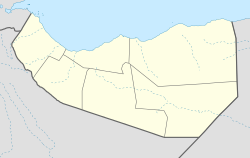Maduna
Maduna | |
|---|---|
Archaeological site | |
| Coordinates: 9°30′04″N 47°09′21″E / 9.50121°N 47.15578°E | |
| Country | |
| Region | Sanaag |
| District | El Afweyn District |
| Time zone | UTC+3 (EAT) |
Maduna (Somali: Maduuna) is a medieval town in western Sanaag region of Somaliland, near El Afweyn.[1][2]
History
[edit]The ruined Islamic city of Maduna is considered the most substantial and most accessible ruin of its type in Somaliland.[1][2] The main feature of the ruined city includes a large rectangular mosque, its 3 metre high walls still standing and which include a mihrab and possibly several smaller arched niches.[2] The mosque is surrounded by several old houses, most of whom being partially intact.[2] The houses include roofed rooms, as well as compounds of dome-shaped structures lacking doors or windows.[3] Just on a slope below the ruined city stands a baobab tree, large enough to suggest that it was planted while the city was inhabited.[2]
Not much is known about Maduna's history, with its dry-stone architectural style suggesting that Maduna was a contemporary of other ruined cities in Somaliland like Amoud and Abasa, meaning that Maduna was presumably part of the Adal sultanate.[2] Swedish-Somali archaeologist Sada Mire dates the ruined city to the 15th–17th centuries.[3]
See also
[edit]References
[edit]- ^ a b Dev, Bradt Guides. "Maduna ruins". Bradt Guides. Retrieved 2022-03-04.
- ^ a b c d e f Briggs, Philip (2012). Somaliland : with Addis Ababa & Eastern Ethiopia. Chalfont St. Peter, Bucks, England: Bradt Travel Guides. pp. 128–129. ISBN 978-1-84162-371-9. OCLC 766336307.
- ^ a b "Somaliland: archaeology in a breakaway state | Sada Mire". Retrieved 2022-03-04.
Sources
[edit]- An Archaeological Reconnaissance in the Horn: The British-Somali Expedition, 1975 - Neville Chittick.



